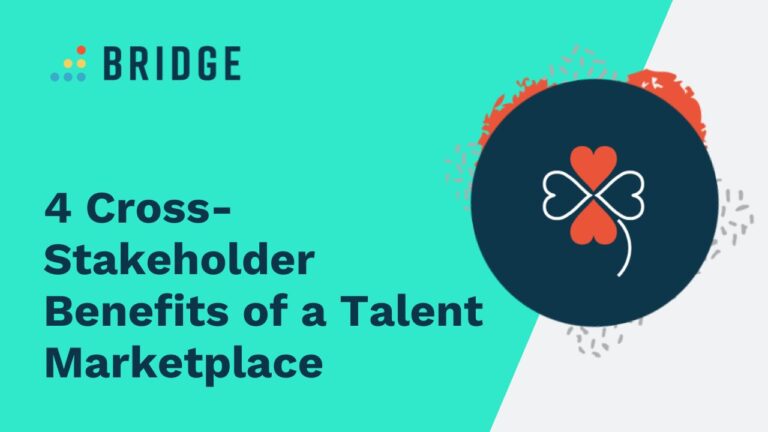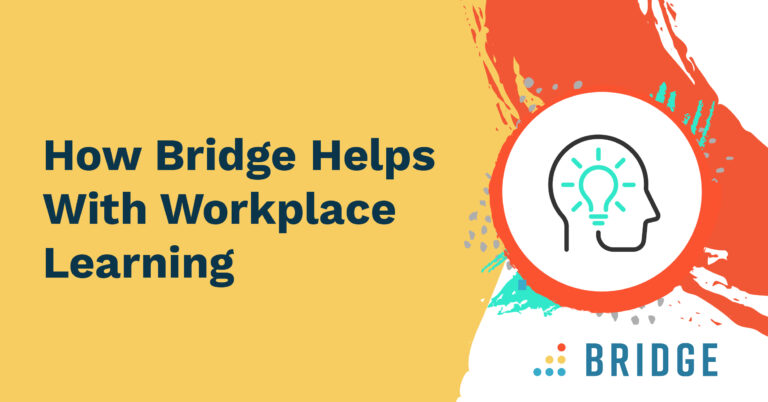When they’re used correctly, talent marketplaces are the keystone of your skills platform—and they offer a wide range of employee development advantages to every stakeholder you’d care to name.
Individual employees, for example, will always benefit from an ecosystem that facilitates and rewards the process of upskilling and reskilling.
For business leaders, there are significant benefits to reducing employee turnover and closing skills gaps—and you’ll find a talent marketplace uniquely capable of achieving both goals.
In order to get the most out of your talent marketplace, you need to understand what its advantages actually look like. While the following list isn’t exhaustive, it does cover some of the most significant and impactful benefits that a well-implemented talent marketplace can offer.
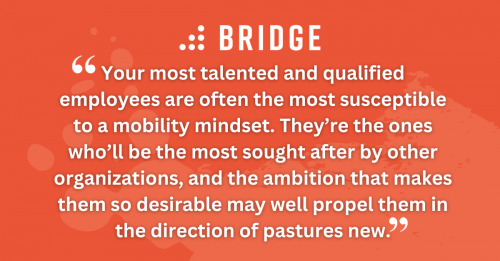
Benefit #1 - Boost Employee Retention
Your employees aren’t going to want to stay in the same position forever. In fact, the average worker switches jobs every two to four years. Considering 80% of employee movement entails switching employers, it’s clear that employers must do more to get their employees to stay.
This goal is especially urgent given that your most talented and qualified employees are often the most susceptible to this mobility mindset. They’re the ones who’ll be the most sought after by other organizations, and the ambition that makes them so desirable may well propel them in the direction of pastures new.
Armed with a robust talent marketplace, however, you’ll be able to offer your employees all the benefits of taking on a new challenge while still retaining valuable and skilled talent for your organization.
Eliminating practical reasons to leave an organization is, of course, a highly effective way to boost retention—but it’s not the only one. 65% of American workers agree that they’d be more likely to stay if they felt their employers did more to reskill them. In this light, a talent marketplace is an overt and striking signal to your people that you’ve got their wants, needs, and career interests at heart.
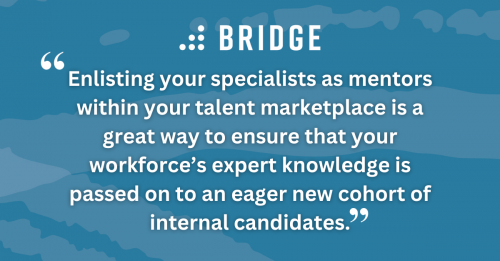
Benefit #2 - Close Skills Gaps
First and foremost, a talent marketplace can close skills gaps by helping you identify where they are. You can’t find skills gaps until you understand exactly what skills your workforce has—otherwise, you’ll have no basis for comparison against the skills that matter in your industry. A talent marketplace makes it easy to map out your organization’s existing pool of skills from the moment you upload your people’s job titles into the system. Even better, it can proactively recommend skills you’ll benefit from mastering based on the current labor market.
Once you’ve identified your gaps, you’ll be in a position to ensure that the right employees are receiving training and experience in the roles that matter. Plus, by fostering a culture of career progression and attainment through your marketplace, you’ll also have a wealth of capable internal candidates on hand to address any loss of existing skills as a result of employee turnover.
The preemptive aspects of talent mobility are especially important when specialized skills and information are locked within the heads of a select few expert employees, especially when those experts are close to retirement. One study of the phenomenon found that only 42% of risk managers agreed that they were somewhat effective at transferring crucial information from retirees to remaining employees, prompting the author to ask: “does the knowledge walk out the door with the person?”
Enlisting your specialists as mentors within your talent marketplace is a great way to ensure that your workforce’s expert knowledge is passed on to an eager new cohort of internal candidates.
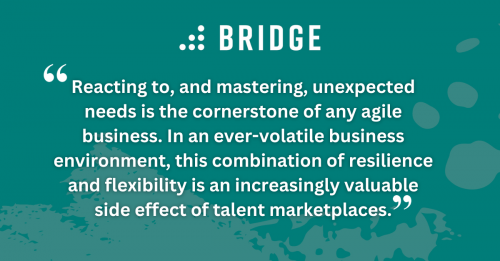
MORE ABOUT SKILLS | ‘How to Train Employees on Soft Skills’
Benefit #3 - Increase Agility in the Face of Evolving Business Needs
Talent marketplaces present the opportunity for individual employees to develop skills they’ve not previously encountered or realized were relevant—and the same can also be said of organizations as a whole.
Reacting to, and mastering, unexpected needs is the cornerstone of any agile business. In an ever-volatile business environment, this combination of resilience and flexibility is an increasingly valuable side effect of talent marketplaces.
It’s not difficult to see how rapidly your workforce’s existing skills can require updating or replacing, especially thinking back to the shifts of the last few decades. The skills involved in running a physical analog store are very different from those involved in ecommerce, and employees well-versed in creating desktop software undoubtedly found themselves in need of reskilling when cloud computing rose to prominence.
When faced with seismic shifts of this magnitude, you might respond by using a talent marketplace to:
- Identify and pursue training and development opportunities that give employees the skills to tackle your new challenge
- Set up mentoring programs to share the relevant knowledge already present among your employees
- Create cross-functional teams or short-term projects that allow your people to gain experience in relevant tasks
By creating an internal talent marketplace, your organization will be able to quickly build the skills and expertise it needs to support your new strategy.
Crucially, in the process, your talent marketplace will allow you to react to these evolving requirements without relying solely on what McKinsey has rightly called “the high cost of external hires”.
Benefit #4 - Increase Cross-Team Collaboration
When employees use your talent marketplace to take on short-term projects, they’re not just gaining valuable experience—they’re also participating in cross-team collaboration. This will benefit your team in a number of ways.
Firstly, a dash of cross-team collaboration can only serve to increase innovation among your workers, bringing together diverse perspectives in a way that, as several commentators have observed, drives new ideas.
Secondly, in a less practical—but by no means less useful—sense, cross-team collaboration has the potential to increase employee engagement. Not only does the practice allow employees to work in areas that interest and motivate them, but it also ensures that they’re meeting and communicating with new people, providing extra opportunities to forge those all-important connections and friendships that fuel engagement for so many employees.
MORE FROM THE BLOG | ‘4 Ways to Fuel Employee Engagement With Skills Development’
Want the Full Picture on AI-Powered Talent Management?
Download our ebook, ‘How AI Can Power Talent Management,’ for a rounded discussion of the features that matter in today’s talent marketplaces—and a glimpse into the exciting interventions that AI technologies are bringing to the space.
